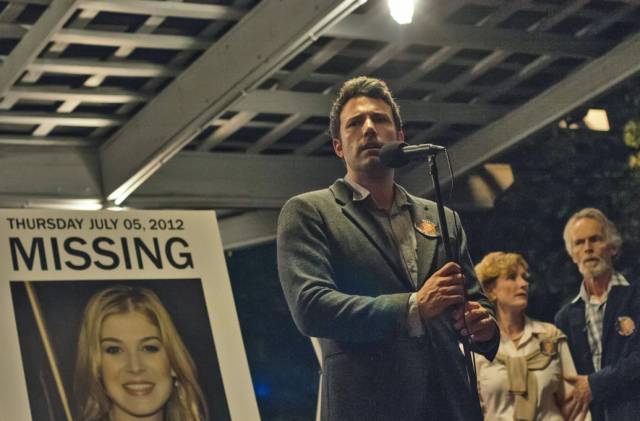
 With Gone Girl, David Fincher takes another dark-hearted bestseller and crafts it into a gripping, atmospheric thriller. For those who haven’t yet had the book pushed on them, the story centers on the marriage of Nick (Ben Affleck) and Amy Dunne (Rosamund Pike). On the morning of their fifth anniversary, Amy goes missing under possibly violent circumstances. As the investigation proceeds, Nick acts very suspiciously, leading many to believe what the evidence points to, that he’s a killer. Meanwhile, Amy’s diary entries give a glimpse into what started as a perfect marriage but went very sour as the two lost their jobs, moved from New York City to Nick’s Missouri hometown, and generally strayed away from being the people they were when they fell in love.
With Gone Girl, David Fincher takes another dark-hearted bestseller and crafts it into a gripping, atmospheric thriller. For those who haven’t yet had the book pushed on them, the story centers on the marriage of Nick (Ben Affleck) and Amy Dunne (Rosamund Pike). On the morning of their fifth anniversary, Amy goes missing under possibly violent circumstances. As the investigation proceeds, Nick acts very suspiciously, leading many to believe what the evidence points to, that he’s a killer. Meanwhile, Amy’s diary entries give a glimpse into what started as a perfect marriage but went very sour as the two lost their jobs, moved from New York City to Nick’s Missouri hometown, and generally strayed away from being the people they were when they fell in love.
If that’s vague, it’s because one of the story’s greatest pleasures is the halfway twist and no one should be robbed of experiencing it fresh. But while the plotting is exquisite, this is more of an emotional thriller, placing an American marriage on the operating table and cutting it open with an acidic glee. “Who are you? What are you thinking? What have we done to each other?” These are the questions Nick asks at the beginning of the film and they echo throughout the flashbacks as we see Nick and Amy’s love turn to sheer poison.
Where Gone Girl excels is its delineation of the preconceived roles and narratives that we fit others and ourselves into, both on a societal level in the media, and in our private lives and relationships. The media, particularly the vulture-like sect of true crime reportage that turns tragedy into ratings, repeats the “dead girl” narrative again and again, the narrative that Nick has to fight, because as the husband, he’s already been judged guilty. One of the best moments of the book and film is Amy’s tirade against the “cool girl” role that every man seems to desire and the humiliations and self-denial that women endure to fit into it.
However, despite Fincher’s skill, the book does lose something on its transition to the screen, as the spoken narration in the film is no substitute for hearing the character’s own interior narration in the book. In the book, Nick is given more depth and pathos as he struggles with his own insecurities and faults and Amy’s verbal feints and justifications are masterfully written. In particular, the famous ending (intact from the book), feels abrupt and jarring on screen, whereas on the page the characters explain it with their own twisted logic.
Still, if Fincher is unable to completely recreate these interiors, he expertly shows the exteriors. Both Affleck and Pike give their best performances to date, and Fincher provides some unforgettable scenes; news vans lighting up a muggy Missouri night, consumerist trash littering an abandoned mall turned homeless refuge, and the decadent lake house of Desi Collings (Neil Patrick Harris). Gone Girl has lost a small bit of charm in its trip to the screen, but is still a treat from one of our most talented directors and so psychologically different from any other movies out there that it’s required viewing. Filled with astute social commentary, dark humor, and riveting suspense, Gone Girl’s dark take on American marriage should be the conversation starter of the year.